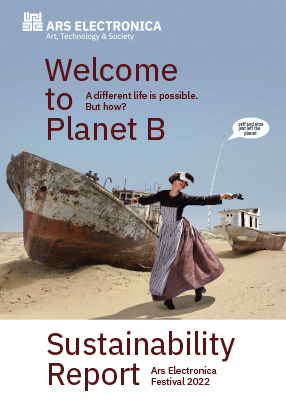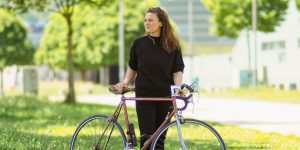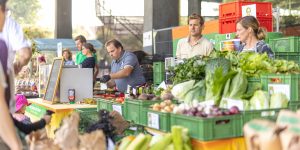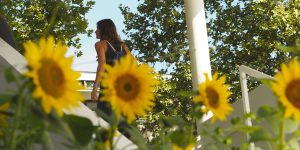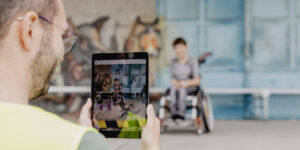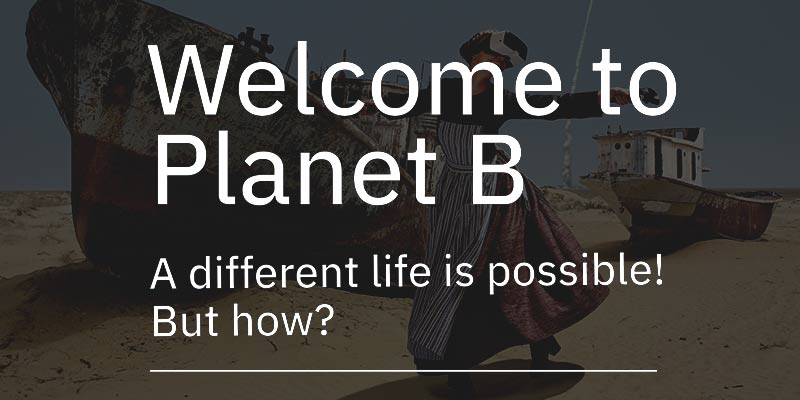What would an Ars Electronica on a “Planet B” look like? In our opinion, it’s a certified “Green Event” with everyone—hosts, participants and visitors—working together to make its ecological footprint as small as possible. In order to make this a reality, we are working together with our partners on a whole range of topics.
Sustainability Report 2022
With this sustainability report, we aim to share our findings and insights with other cultural events, in the hopes of fostering a greater understanding and commitment to sustainability.
DownloadThe Ars Electronica Festival will once again be a “Green Event,” certified by the Climate Alliance of Upper Austria.. We are guided by the 17 sustainability goals set forth in the 2030 Agenda for Sustainable Development. To keep the CO2 footprint of the festival as low as possible, we have reflected on our internal processes, procedures and actions. Certain fields of action require particular thought, such as mobility, catering & food and event location (which includes energy, water, sanitation, technology and equipment, procurement & waste, social responsibility and communication). Holistically speaking, the Green Event criteria are taken account of, too.
In this way, we not only seek to provide food for thought and raise awareness of sustainability, but also to create incentives for our visitors, artists and partners, which they may adopt independently in their actions; after all, only together can we bring about meaningful change.
This year, we aim to analyze the Ars Electronica Festival’s individual fields of action in order to create a good data basis for reducing the festival’s carbon footprint in subsequent years. In the long term, we aim continually to optimize all major organizational processes beyond the festival itself in terms of their climate and resource compatibility. In addition to ecological aspects, intensive contact with our partners and service providers are also important in promoting sustainable behavior through long-term cooperation.
The following measures and policies are implemented in the respective fields of action:
Mobility
- Use of electric vehicles (EV) in production, for passenger and material transport, in partnership with Höglinger Denzel GmbH and Graf Carello.
- New clause in the contracts: No short-haul flights of less than 1,500 km; travel on the public rail network within Europe; use of a CO2 compensation calculator for long-haul flights in collaboration with Climate Austria.
- Free use of public transportation within Linz for artists and employees in cooperation with Linz AG.
- Green Mobility infrastructure for visitors at JKU, as well as protected parking spaces for bicycles.
- Bike repair stations and bike repair workshops offered by Bikekitchen Linz.
Event Location, Event Equipment and Technology
- The main festival location, the JKU is also a Climate Alliance partner and a Green Campus.
- Protection of green areas and plants at the festival locations. Precautions are taken in advance, such as a walk-through with arborists and green space caretakers.
- Barrier-free accessibility to the festival area and to all events.
- Concerning accommodation, we make sure that hotels are within walking distance of the festival site or well connected by public transport.
- Technical devices and equipment are rented from local companies, such as our long-term partner AfB. The company has been committed to ecological action in the IT industry and inclusion in the labor market for more than 15 years.
Energy, Water & Sanitation
- Drinking water in the form of water dispensers will be offered around the festival area and bringing refill bottles will be communicated.
- The aim is to use as little water as possible in production, including raising awareness through campaigns and information on site.
- Use of green electricity at the JKU festival location and conversion of the Ars Electronica server to green electricity.
- In the exhibition area, the event technology and lighting will be switched off outside of exhibition operation.
Food & Catering
- Culinary offerings during the festival will be mostly meat-free; vegetarian and vegan options will be available. The partners commit themselves to use mainly seasonal and regional food from organic cultivation farming.
- In cooperation with local producers, we offer an open kitchen at the festival, where visitors can enjoy organic fruits and vegetables for free.
- In cooperation with Bio Austria, we organize an organic market during the festival.
- Non-regional food like coffee, tea etc. will be sourced from fair trade.
- Catering for employees during the festival will take the form of distributing food vouchers and providing snacks and fruit at the workplace.
Procurement & Waste
- Existing waste separation systems will be used at the festival locations. Additional temporary waste containers will be sorted and recycled by Linz AG after collection, based on the festival’s waste concept.
- Compostable tableware from catering outlets will be turned into compost by Brantner Green Solutions.
- Disposable tableware is not used at the festival unless it can be recycled directly.
- Exhibition materials are largely borrowed from cooperation partners and returned in full after the festival.
- Architectural elements will be built from reusable systems; cooperation with Ringer Scaffolding, as well as the use of IBC, a waste product from industry, which will be used temporarily at the festival and subsequently given away to local farms for further use.
- Development of a modular exhibition architecture system that can be stored in a space-saving manner. Thanks to a concept without drilling, the elements can be reused unchanged in the years to come.
- Long-term cooperation with the Linz City Gardens for the greening of the exhibitions and the festival architecture.
- All printed materials will be reduced as much as possible and no giveaways or scattered advertising will be used.
- The festival catalog will be produced in small print runs on eco-certified paper and will not be individually packaged.
- Project lettering and prints are standardized and changed to eco-friendly materials (indoor/outdoor).
Social Responsibility
- A sustainability code of conduct for employees and partners has been developed and is applied.
- Fair Pay is anchored in the corporate structure and is considered in the fees paid to invited protagonists.
- The Transformation Sustainability Lounge as a physical representation at the center of the Ars Electronica Festival. The sustainability strategy will be communicated on site and sustainability partners will present their solutions. The Lounge will invite discussion and debate on the subject through lectures, workshops and interactive installations.
- Awarding of the education prize Klasse!Lernen in cooperation with the OeAD Digital Learning and the Federal Ministry of Education, Science and Research. The awarded projects were jointly developed by teachers and students to promote the digital transformation in schools.
- Contribution to an open, democratic, and inclusive society through collaboration with FAB. FAB is a non-profit association that creates the conditions for successful and lasting professional integration for people seeking work through qualification, employment, advice, and support.
- The festival website was redesigned to be more sustainable and accessible by reducing the amount of data (volume).
- “We Guide You” offers multilingual tours of the festival exhibitions, for all ages, and special tours on sustainability are offered.
- The opening and award ceremony is simultaneously translated and can be followed bilingually (EN/DE).
- Festival ticket discounts for a wide range of people, as well as free admission up to the age of 19 and for holders of the cultural pass “Hunger auf Kunst und Kultur.” All publicly accessible festival areas and several locations can be experienced without a ticket.
- Designating a contact person for sustainability on the website, so that suggestions and comments can be submitted.
- Employment of a staff member for the further development and evaluation of the sustainability strategy.
- Further projects on the topic of social responsibility can be found in the festival program on the website as well as in the catalog.
Communication
- Partners have been informed and involved; the individual measures are specified in contractual agreements. Guests and visitors are notified in the invitation about the environmentally friendly orientation of the event and are actively involved.
- Inclusion of sustainability in the employee handbook and team-internal communication and integration in the further development of the fields of action.
- The festival’s sustainability policy communicated and specified in press conferences as well as in several blog articles, press announcements and social media contributions.
- Presentation of the topic “sustainability” as a separate item on the festival website, including an explanation of the measures within the Green Event fields of action.
- After the festival, the findings and results will be summarized in an implementation report and communicated externally. The evaluation will be published in the form of a survey.

